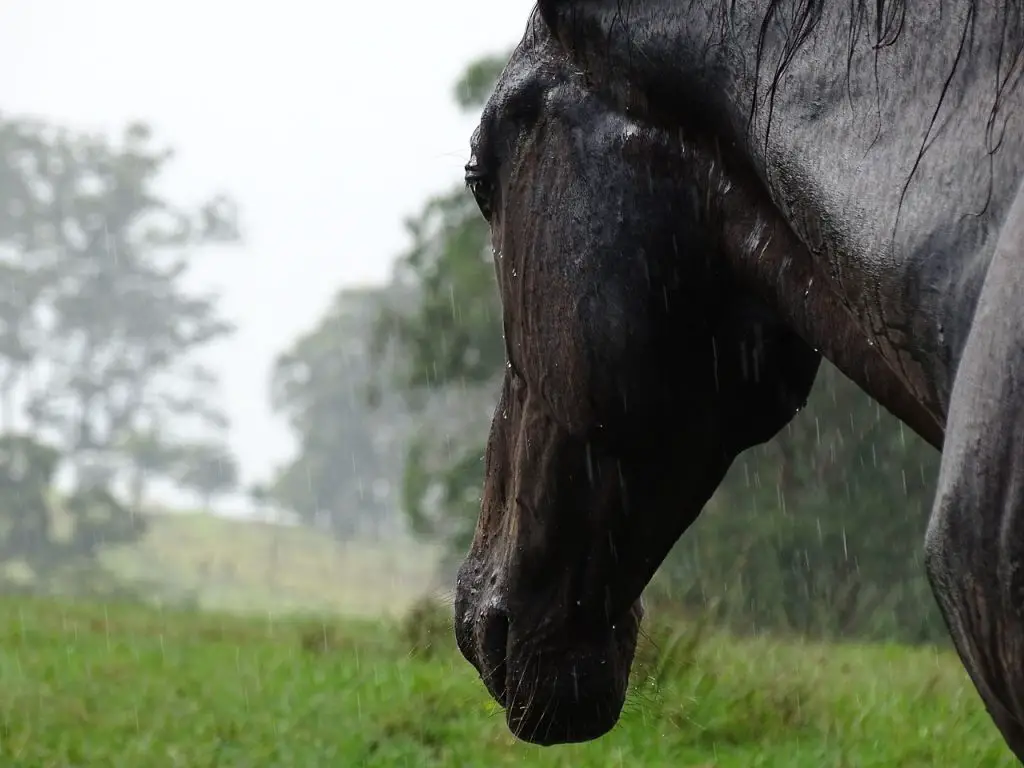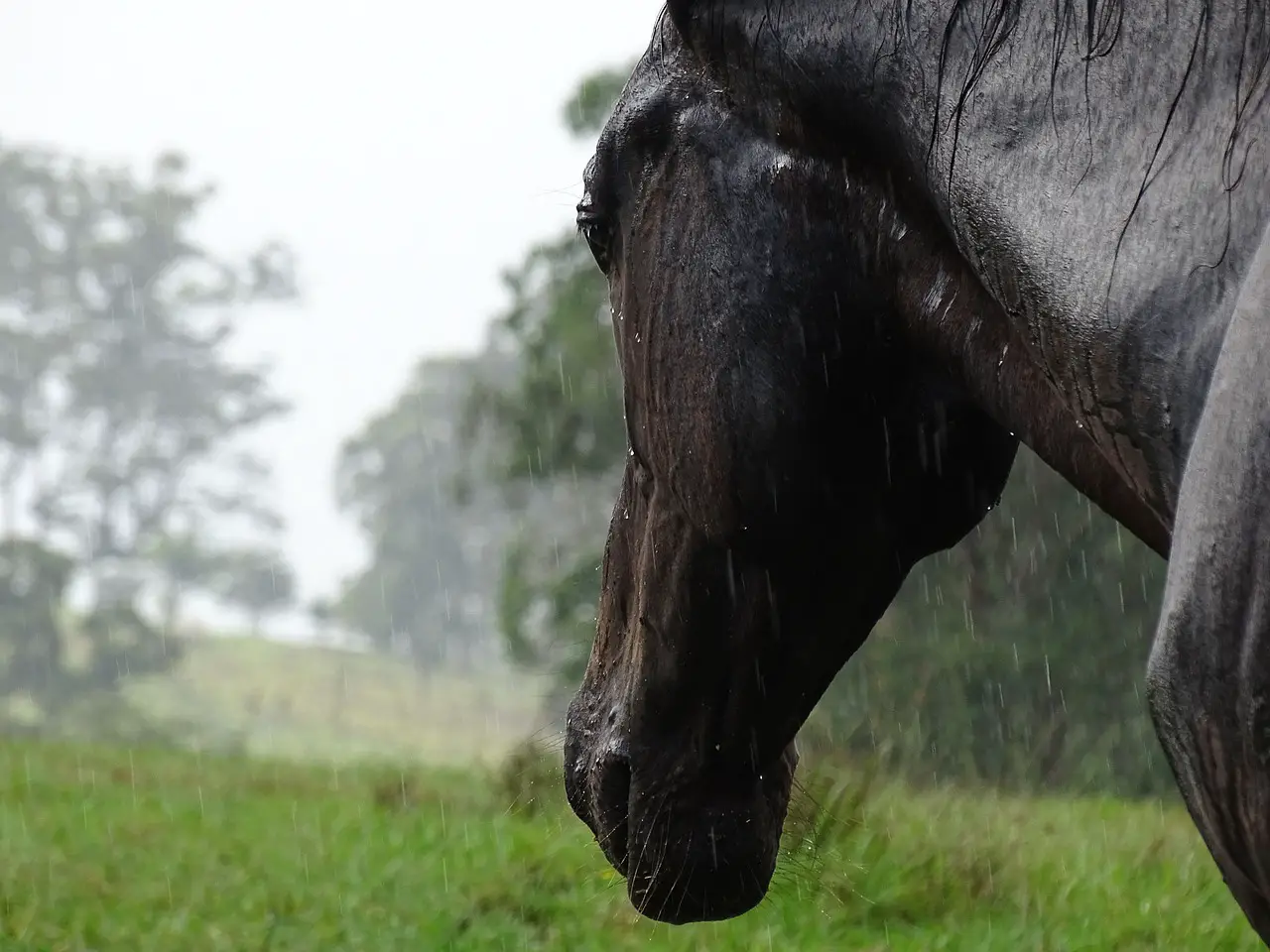Last Updated on February 22, 2022 by Allison Price
We tend to believe that indoors is the best place for horses when it rains. But is this really what your horse needs? Research shows that horses prefer to be outside. But is this really the best thing for them?
Is it okay for a horse to be left outside in the rain? Most horses will be able to stay outside if the rain isn’t too heavy or the wind not too strong. You should blanket them if their coats have been cut.
Everyone has their own opinion about whether or not it is better to bring your horse in when it is raining. This can make it more difficult to decide what the right thing should be. While both sides have valid points, the fact remains that horses and conditions are unique. This is why I wrote this article. I have owned horses for many years and learned (sometimes hard) what is best for them. I decided to write this article to help you make an informed decision about winter care for your horse.
Can a horse be left out in the rain?
Horses have a waterproof coat that keeps them dry and warm. However, this is not always possible if the rain is heavy or for long periods of time. Their problem is that their coat clumps and sticks to their bodies the more they get wetter. The horse loses its ability to heat and can quickly become cold. In some cases, even hypothermia.
This doesn’t mean that you should bring your horse in as soon as the sky turns gray. However, they shouldn’t remain out in the rain. You’ll see horses seek shelter under trees and large shrubs if it rains.
Are horses susceptible to getting sick from the rain?
The rain doesn’t necessarily cause harm to your horse, but it can make your horse more susceptible to the negative effects of rain. Rain can cause a variety of problems and conditions.
Leptospirosis
Although rare, leptospirosis can be a serious bacterial infection. It can cause abdominal pain, fever, and even loss of appetite. The bacteria lives in the soil and is usually spread by heavy rain.
Rain rot
Rain rot, also known as dew poisoning or dew poisoning is a bacterial skin condition caused by the bacteria Dermatophilus Congolensis (or D. Congolensis). Although this bacteria is naturally found on horses’ skin, wet and humid environments can lead to infections. Dry scabby lesion formations on areas exposed to rain like the neck and back can result.
This is good news because it’s possible to avoid this by keeping your horse’s hair clean and regular grooming. However, if your area is prone to high humidity and rain, it may not be possible to prevent this. It’s important to ensure that your horse doesn’t get too wet or that he dries quickly in these situations.

Mud fever
Similar to rain rot, mud fever affects only the legs. It is caused when the horse stands on wet or muddy ground for long periods of time. The bacteria, which lives naturally on the skin, stays on the skin. However, if the skin becomes softer due to mud, the bacteria can penetrate the skin and cause infection.
Hoof Infections
Thrush, which is the most common hoof disease, mostly affects the frog but can also affect the heel. The horse may have difficulty walking due to the fact that it is often caused by prolonged water exposure.
Mosquitoes
Many people don’t realize the impact that rain can have on mosquito populations. However, it can make them more severe if there is a lot or standing water.
Although the mosquitoes aren’t likely to cause any harm to your horse, they can transmit a number of diseases. Therefore, an effective insect management plan should be considered.
How can I protect my horse against the rain?
There is nothing you can do to stop the rain, except move to an area that receives less rain. However, there are steps you can take in order to minimize the effects of the rain on your horse.
Make sure you have a shelter
You should provide shelter for your horse if you can’t do any other to protect him from the rain. A three-sided shelter is better than no shelter at all. Natural shelter is fine, but it’s better than nothing at all. This will allow air to circulate and give the shelter the ability to provide refuge from the rain.
Brush your horse regularly
Regular brushing can protect your horse from the rain in two different ways. It will remove any mud and reduce the risk of infection. However, it can also encourage the production of natural waterproofing oils. These oils can not only condition your horse’s coat, but also protect him from rain.
Apply pig oil to your horse’s legs
You’ve probably seen eventing or cross country events where the horses’ chests were covered in a white substance. This is likely pig oil, which is great for waterproofing their legs. It will prevent mud fever by rubbing it lightly on the legs. Most tack shops will carry pig oil, but you can also buy it online from Amazon.
Wrap your horse’s legs
Wrapping your horse’s legs in bandages, even if they get really muddy, will allow the mud to dry and make them far more comfortable than having to hose them down. You can brush off the mud once it has dried.
Trim the tail of your horse
Trimming your horse’s tail a bit during winter will prevent it from getting muddy and reduce the chance of getting infected by the bacteria that lives in the mud. It will grow back and be ready to swatt flies in the summer.
Don’t over blanket your horse
It’s a common occurrence for the weather to be milder in the rainy season. This will help reduce heat buildup, which can lead to other problems.
Lay hay around your horse’s pasture
You should keep your horse out of the cold during winter, or at least part of it. Also, don’t feed it all in one spot. You can prevent one area from getting too muddy or boggy by putting smaller amounts in different locations. It is best to avoid putting it in areas that are heavily used, such as gateways.
Stick straw in muddy areas
This is not the right yard for you. However, straw placed on top of wet or muddy areas will absorb some of the water. It will also act as a barrier between the wet soil and your horse’s legs and hooves. This will help to reduce the ground’s bogginess and provide some cushioning.
Make sure that your horse is occupied with boredom-busting
If it is too cold to take your horse to the barn, make sure that you have plenty of boredom busters to keep him entertained and happy while he is stalled. Although I personally love a ball feeder, there are many options.
Are horses allowed to stay outside during thunderstorms?
It might surprise you to learn that while some horses may be frightened of bright flashes and loud noises, the majority of horses love being outside during a thunderstorm. It is not only safer for horses to be outside in a thunderstorm, but most horses actually prefer it.
Some argue that horses should be kept in open fields during storms to reduce the risk of injury. There is logic to this argument, but it is also possible that horses will be more safe if they are outside. While this is true for hurricanes and tornadoes, I don’t know if lightning can move so fast that a horse could run it.
It is obvious that horses will be safer if they are in fields with trees. However, lightning strikes on trees can cause injury. This is why many people bring their horses in when there is a storm.
There is no right or wrong way to decide whether your horse should be brought in during a storm. Every owner must do the best thing for their horse and take into consideration the immediate risks.
I prefer to leave my horses outside. It allows them to make their own decisions and allows them to adapt to changing conditions. Two caveats are that you must ensure that your horse has shelter. A lightning rod is also kept close to my shelter in order to minimize the possibility of lightning striking it.


